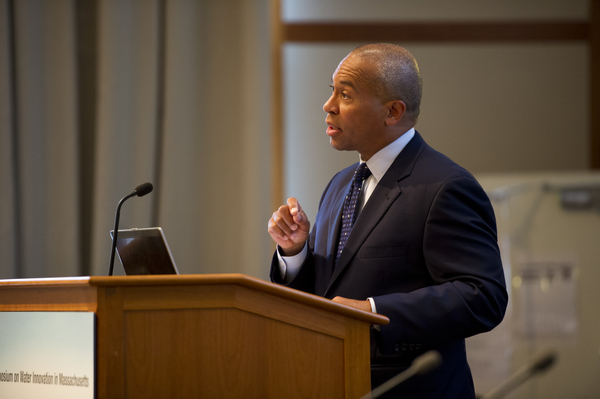A rising tide lifts emerging water innovations

Water may not be the first that springs to mind when thinking about the next big arena for innovation in America. For much of the country, water is a commonplace part of life, easily accessible from the tap.
Yet it’s not that simple. Infrastructure that’s long delivered clean water to communities across the nation is rapidly aging, and there are still parts of the world where clean water is difficult or impossible to obtain. Those challenges and numerous others have Massachusetts business, policymakers, and academics exploring new opportunities to innovate and lead an emerging market.
“I would argue that we have some of the best and brightest minds working here in the Commonwealth, but we don’t have the mechanism to bring us all together,” said Earl Jones, a partner at Liberation Capital. “This is a really powerful and influential group, one that sets the table for what needs to be done.”
Jones served as chair of the Symposium on Water Innovation in Massachusetts, or SWIM, held Wednesday in Northeastern’s Curry Student Center and sponsored by the D’Amore-McKim School of Business, with organization by faculty members Ron Whitfield and Marjorie Platt.
Water already represents a multi-billion industry in Massachusetts. SWIM’s goal was to bring together the top industry, academic, and government minds to develop a new water cluster, similar to the technology corridor along Route 128 or the life sciences industry in Cambridge and Boston.
Massachusetts is positioned to become a leader in water innovation not just in the United States but on a global level, said Gov. Deval Patrick, who delivered opening remarks at the conference. Just as investment in education, innovation, and infrastructure have boosted fields like life sciences, biotech, and digital technologies, so too can policy boost industries dedicated to keeping water clean, safe, and accessible, he said.
“We have an unusual concentration of brainpower here,” Patrick said. “We have to cultivate it.”
The water industry, Patrick said, is fragmented across a number of specialized fields, which need to work together to develop a cluster that can advocate for its collective interests and draw new talent to the region. “Massachusetts is now at the center of the clean energy revolution and we have the potential to do the same with water innovation,” he said.
Mel Bernstein, the senior vice provost for research and graduate education at Northeastern, said students play a key role to guiding innovation in fields like water, merging their real-world experience with a drive to develop new technologies.
“We’re preparing the next generation of students to think about these problems,” Bernstein said.

Mel Bernstein is the university’s senior vice provost for research and graduate research. Photo by Brooks Canaday.
One of those students prompting innovation is Antonio Rufo, a rising senior studying electrical and computer engineering. He co-founded FilterLight, a company that developed a technology that uses a crank-powered LED to improve access to clean, drinkable water.
The device was awarded an Excellence in Innovation at RISE, Northeastern’s annual research exposition held this spring; the prize came with $1,000, which the student-researchers reinvested into product development. Now, Rufo and his partners are working to develop partnerships that can help them bring their invention into the field, an opportunity presented to them by the SWIM event.
“We have the proof of concept and we know we have something that works,” Rufo said. “Now we’re looking for investors and connections so we can get this out into the market. This is a group of people with the connections that can help us do that.”
Alongside FilterLight at SWIM’s exposition highlighting work at the forefront of water innovation were two academic endeavors from the College of Engineering. Two students from the Puerto Rico Testsite for Exploring Contamination Threats (PROTECT), doctoral student Ali Ciblak and postdoc Lily Rajic, showcased work on solar-powered electrochemical technologies for groundwater treatment. Researchers Annalisa Onnis-Hayden and Loretta Fernandez presented their work, developed in associate professor April Gu’s lab, which focuses on biological sensors for a variety of contaminants.





